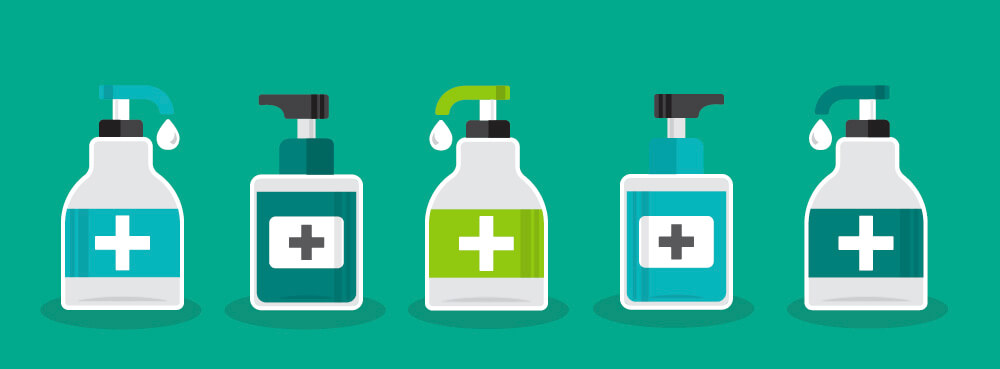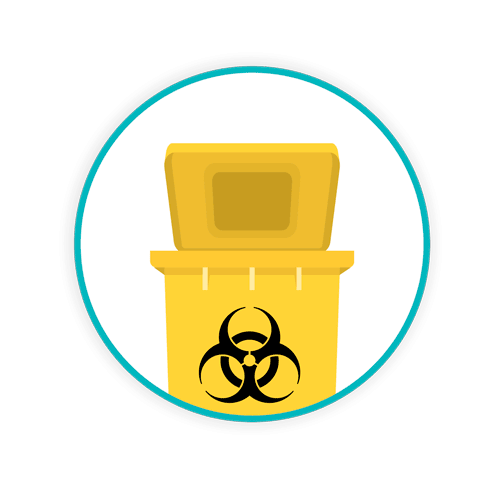Everything You Need To Know About Hand Sanitizer Disposal

In the wake of the global COVID-19 outbreak, healthcare and environmental agencies around the world have been stressing the importance of hand-hygiene protocols with an increasing spotlight on the clinical efficacy of sanitization products available on the market. Paramount to the protection of employees during the coronavirus pandemic as recommended by the Centers for Disease Control and Prevention (CDC), USDA agencies have identified hand sanitizer as an essential component of their combative plan and with this increased market stock levels comes the challenge of how best to dispose of expired or excess stock.
TOPICS WE WILL COVER:
1 / Hand Sanitizer Waste Classification
4 / Determining the Clinical Efficacy of Hand Sanitizer Products
5 / Hospital and Healthcare Management of Hand Sanitizer Disposal
Hand Sanitizer Waste Classification
Most “clinically approved” hand sanitizers typically contain between 60-95% ethyl or isopropyl alcohol. At this level of alcohol concentration, the product is classified as a Class 3 Flammable Liquid.
Hand Sanitizer Storage
In November 2020 the US Department of Agriculture issued a memorandum providing guidance regarding the management and disposal of hand sanitizer. Within this dissertation, it was instructed that USDA Agencies must manage all hand sanitizer as a Class 3 Flammable Liquid in accordance with 29 CFR § 1910.106 and 1926.152. Under OSHA (The Occupational Safety and Health Administration), such products are prohibited from being stored in office buildings and, when stored for future use, accumulations of 25gallons or more (irrespective of whether the full volumes are contained in individual or separate smaller containers) must be placed in a flammable liquid storage cabinet in a non-office building.
Our recommendations for hand sanitizer storage are as follows:
- Both the hand-sanitizers being disposed of and the Hazardous Waste Containers into which they are being staged for disposal must be closed with a proper fitting top
- Containers must be marked with the words ‘Hazardous Waste’ and with other descriptors that identify the contents of the container (in this case, “Hazardous Waste – Ethanol Cleaner”
- Any vessel containing flammable material must be stored away from oxidizers and sources of ignition
Hand Sanitizer Disposal 
Federal disposal guidelines stipulate that all alcohol-based hand sanitizer products be treated as hazardous waste due to the ignitability characteristic (40 CFR § 261.21). Like all hazardous wastes, proper disposal is limited to a certified waste hauler that is permitted to transport and store hazardous waste. Any products that contain methanol or 1-propanol (more about this in the next section), should ideally be returned to the supplier for disposal.
Irrespective of the product type or product brand, hand sanitizer should not be disposed of in standard trash or flushed down the drain. Disposal of alcohol based hand sanitizer products require hazardous waste registration, labelling, manifesting and waste reporting at both a state and federal level.
Not to get into too much “gnitty gritty” but because hand sanitizer is classified as a hazardous waste, your facility does fall under the EPA’s generator status, so your disposal requirements will differ depending on the volume of hazardous waste your facility generates. The below criteria is utilized by the EPA to classify hazardous waste generators:
- Large Quantity Generators (LQGs) generate 1,000 kilograms per month or more of hazardous waste, more than 1 kilogram per month of acutely hazardous waste, or more than 100 kilograms per month of acute spill residue or soil
- Small Quantity Generators (SQGs) generate more than 100 kilograms, but less than 1,000 kilograms, of hazardous waste per month
- Conditionally Exempt Small Quantity Generators (CESQGs) generate 100 kilograms or less per month of hazardous waste, or 1 kilogram or less per month of acutely hazardous waste, or less than 100 kilograms per month of acute spill residue or soil
Determining the Clinical Efficacy of Hand Sanitizer Products
One of the critical assertions made in the US Department of Agriculture’s memorandum was the responsibility on the waste generator to understand the ingredient profile of the hand sanitizer being used. The speed at which the pandemic escalated in the United States forced the emergence of unvetted substandard products being circulated into the market – and one of these defect product categories included hand sanitizers.
“All Americans should practice good hand hygiene, which includes using alcohol-based hand sanitizer if soap and water are not readily available. Unfortunately, there are some companies taking advantage of the increased usage of hand sanitizer during the coronavirus pandemic and putting lives at risk by selling products with dangerous and unacceptable ingredients. Consumers and health care providers should not use methanol-containing hand sanitizers”
— FDA Commissioner Dr. Stephen Hahn
The FDA has clearly stated that methanol and 1-propanol are not acceptable active ingredients for hand sanitizer products and, due to their toxic effects, must not be used. Methanol can be toxic when absorbed through the skin and life-threatening when ingested. Through internal investigations, the FDA noted that hand sanitizer products containing these toxic alcohols are often incorrectly labelled, and therefore it is the duty of the user to correctly identify the efficacy of the product being used. The most current information on hand sanitizer testing and products suspected to contain methanol and 1-propanol can be found at www.fda.gov/unsafehandsanitizers.
Hospital and Healthcare Management of Hand Sanitizer Disposal
Hazardous waste management is a core function of our healthcare waste expertise; nearly all of our waste processing facilities across the country are permitted for both transportation and storage of hazardous waste, and our own hazardous waste division, MCF environmental, has been instrumental in creating custom waste accumulation and disposal programs to combat the new challenges bought about by the coronavirus pandemic.
Whether you represent a hospital or a smaller patient care facility, we have both the compliance expertise and the national service infrastructure to be able to provide a solution that meets the unique disposal needs of your facility. For further questions surrounding the handling of hand sanitizer products or other hazardous substances, connect with one of our waste experts below to learn how we could customize a solution for you or visit our hand sanitizer disposal page.
Let's Talk!
Your time is valuable, and we don’t want to play hard to get. You can either phone us directly on the details listed on our contact page, or feel free to fill out this short form and one of our team members will get back to you as quickly as possible.
